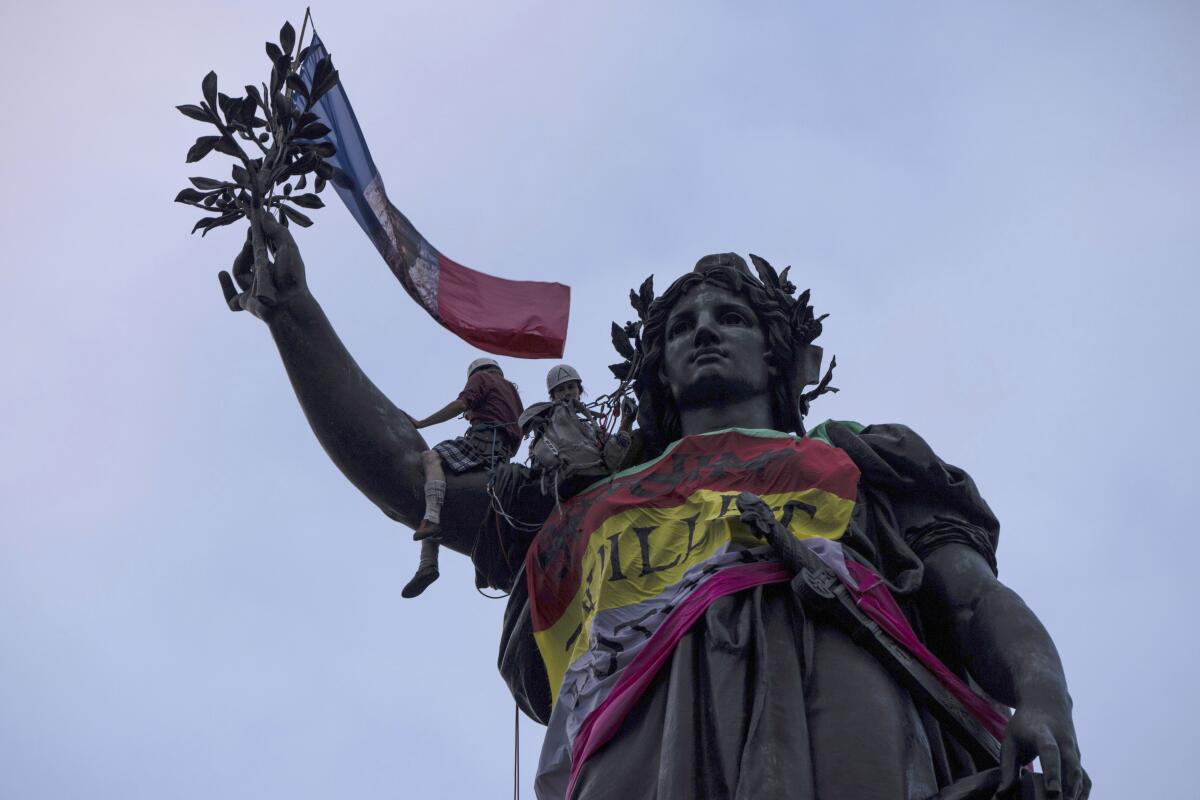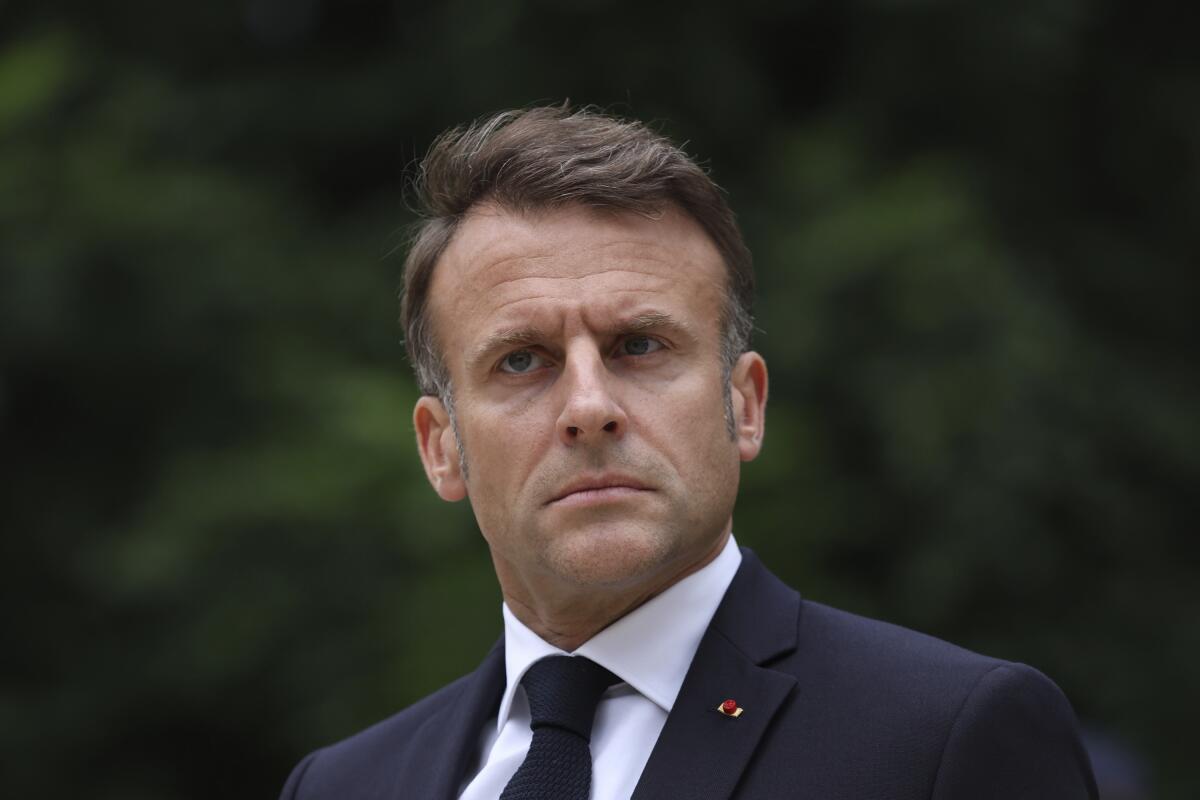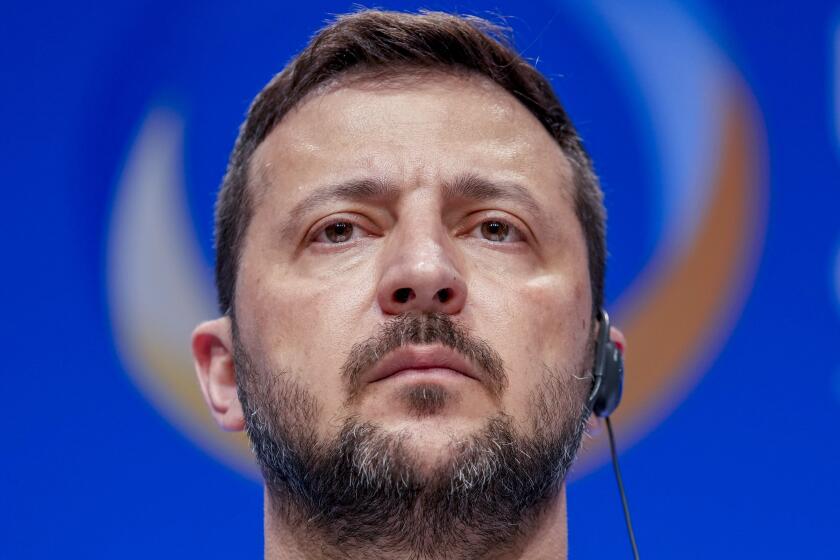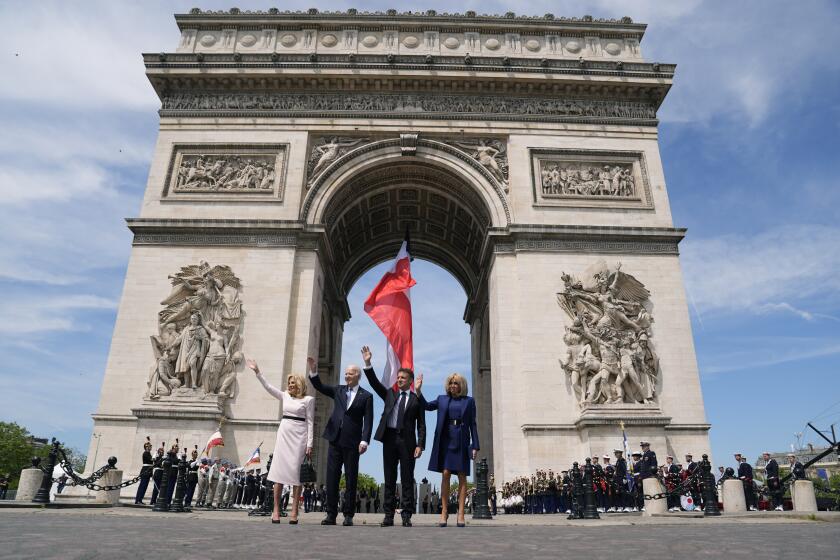France braces for potential political earthquake: a far-right surge. What to know about the election

- Share via
PARIS — For decades, there’s been a strong political taboo in France against a far-right party coming to power. Now, just weeks before the showcase Summer Olympics begin in Paris, the nationalist-populist National Rally is making its most concerted bid ever to do just that.
In Sunday’s second and final round of voting, the anti-immigration, “French-first” party is forecast to become the largest in Parliament — although the latest projections suggest it will likely fall short of an absolute majority that would allow it to form a government.
Whether or not opponents succeed in banding together to blunt its most ambitious aims, the National Rally will likely be in a position to harry and hamstring centrist President Emmanuel Macron, who assumed his post in 2017 and still has three years remaining in his current term.
“It means that France is entering a crisis,” Gerard Araud, a former French ambassador to the United States, said after the far-right party cruised to first place in an initial round of voting June 30. Speaking on an Atlantic Council podcast, Araud called the situation an “unmitigated disaster” for Macron.
Galvanized by the National Rally’s early triumph, other parties, including Macron’s centrists, have spent this week working frantically to prevent it from attaining an absolute majority, an outcome that would force Macron to install its 28-year-old leader, Jordan Bardella, as prime minister.
Ukrainians displaced by war find new purpose in Shakespeare’s play of love, loss and madness, bringing their blood-red version to the bard’s hometown.
Even if the far right fails to meet that threshold, it could potentially cobble together a ruling coalition, or simply use its newfound clout to gum up the agenda of Macron, whose party until now held the largest number of seats.
Here is some background on how France arrived at this chaotic political juncture.

Flags adorned a statue above Paris’ Place de la Republique on Wednesday.
Who is contesting the vote and what is at stake?
The parties are vying for 577 seats in the National Assembly, the lower and more powerful house of Parliament. The National Rally hopes to win at least 289 seats, which would allow it to form a government without needing coalition partners.
The three main political blocs in the running are the National Rally; a coalition called the New Popular Front, which includes center-left and hard-left forces, along with environmentalists; and Macron’s centrist alliance. They came in first, second and third, respectively, in the June 30 first round of voting.
For the coming round, various complexities in the French electoral system make predictions difficult. Because lawmakers are elected by district, the result does not necessarily reflect overall levels of nationwide support for a given party.
Sometimes in Gaza it feels like a cigarette is the only thing that might help. But even that is out of reach.
Why is this vote happening?

Macron, whose presidential term lasts until 2027, did not need to call a parliamentary vote. But three weeks ago, after the National Rally outpolled his Renaissance party by a 2-1 margin in June’s European Parliament election — a stinging but mainly symbolic rebuke — he said he wanted “clarity” about voters’ wishes, and called a snap election.
Analysts said Macron apparently gambled, as he has in the past, that the French electorate would recoil from actually being governed by the National Rally, and that the outcome of the European election, which does not directly affect national governance, essentially amounted to a protest vote.
The president’s decision, taken within hours of the EU vote result, stunned France. According to French news accounts, only a tiny coterie of advisors knew of the move in advance of Macron’s announcement. That inner circle did not include his prime minister, Gabriel Attal.
What is the National Rally?
It is a rebranded version of the former National Front, whose founder, Jean-Marie Le Pen, was a notorious racist who sought to trivialize the Holocaust. Marine Le Pen, the founder’s daughter, worked assiduously to detoxify its brand, putting an emphasis on bread-and-butter issues, distancing herself from some of the party’s most extreme stands and even ejecting her father in 2015. With her blessing, Bardella replaced her as party leader in 2022, though she is expected to run as its presidential candidate when Macron’s term expires in 2027.
The French distaste for the far right has deep historical roots, dating back to the collaborationist Vichy regime during World War II, which delivered many of the country’s Jews to death at the hands of the Nazis. Many here still consider Vichy a lasting stain on the national honor.
What positions does the National Rally support?
It promises to cut immigration, increase police powers and give native-born French citizens preferential treatment over dual nationals and foreigners, together with other measures that critics say would infringe on civil liberties.
In the past, the party has fiercely rejected the European Union, a position it has since moderated, but it still wants to work from within to weaken the powers of the 27-nation bloc.
Marine Le Pen also has a long history of sympathy for Russian President Vladimir Putin, and the Kremlin has cheered her efforts to break free of what it calls the dominion of Washington and of Brussels, seat of the EU.
Ukrainian President Zelensky is all over Europe, including at the G-7. His message? Ukraine’s war with Russia and Putin is Europe’s fight, too.
Why did people turn against President Macron?
When he won election seven years ago, at age 39, Macron was the country’s youngest-ever elected head of state, a proud technocrat who set out to deepen integration with the European Union and make France a more attractive business climate. But he also garnered a reputation for arrogance and dismissing the concerns of ordinary voters, such as the cost of living and income stagnation, especially in disadvantaged rural areas. His move to increase the retirement age from 62 to 64 was wildly unpopular, spurring mass protests.
How might a National Rally victory affect the war in Ukraine?
Substantially and negatively. Macron has been a strong supporter of the government of President Volodymyr Zelensky as Ukraine tries to fight off Russia’s full-scale invasion. The French leader has not ruled out the possibility of sending French troops to Ukraine to help train its army; the National Rally would oppose that. Bardella has also said he would block France from providing Ukraine with long-range missiles that could hit targets within Russia.
President Biden is feted by French President Macron with a state visit in Paris as leaders aim to show partnership on global security, ease trade tensions.
What would a far-right win in France mean for the United States?
In France, the office of the presidency wields the greatest influence and authority in foreign affairs and national security, but a far-right prime minister would likely seek to erode that dominance. Much of Macron’s tenure overlapped with the presidency of Donald Trump, with whom the French leader sought to build a workable relationship, although Trump’s successor President Biden was more of a natural ally. Trump’s domestic backers have expressed glee at the prospect of far-right ascendancy that would leave Macron weakened.
How are rivals seeking to block the National Rally?
Mainstream parties in the past have banded together to form a firewall against the far right, and they are trying to do so again. Leading up to second-round balloting, the National Rally’s opponents have embarked on “tactical voting,” in which candidates in some constituencies abandon the race to help boost non-far-right candidates. By midweek, more than 220 leftists and centrists had pulled out of their runoff contests.
The strategy could produce a “hung parliament,” in which no bloc has a clear majority, which could lead to a prolonged period of political instability. No new general election can be held for at least a year.
As the contest has narrowed, opponents have been mining social media accounts and old pictures of National Rally contenders, seeking to diminish their base of support or force them out of the race. One candidate dropped out of her local race after a photo emerged of her clad in a World War II-era cap like those worn by Nazi officers.
More to Read
Sign up for Essential California
The most important California stories and recommendations in your inbox every morning.
You may occasionally receive promotional content from the Los Angeles Times.














